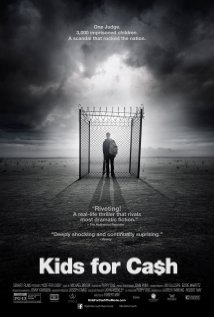Juvenile Incarceration: America’s Prison Complex
 Designed both to outrage and inform, Robert May’s latest documentary film, Kids for Cash, reveals a troubling case of judicial abuse surrounding Luzerne County, Pennsylvania. But what makes May’s document more than an expose of abuse is that he looks at our culture at large from which the scandal emerged. The equally troubling story that he tells has to do with a sweeping policy to which the nation has been blindly uncritical in the wake of Columbine and other teen violence afflicting our nation—that is, community policies or should we say policing policies of “zero tolerance” at high schools. May situates such policies within his frame, suggesting that they allowed the judges carte blanche to enforce severe measures onto an age once treated with more innocence but now treated with gross indifference.
Designed both to outrage and inform, Robert May’s latest documentary film, Kids for Cash, reveals a troubling case of judicial abuse surrounding Luzerne County, Pennsylvania. But what makes May’s document more than an expose of abuse is that he looks at our culture at large from which the scandal emerged. The equally troubling story that he tells has to do with a sweeping policy to which the nation has been blindly uncritical in the wake of Columbine and other teen violence afflicting our nation—that is, community policies or should we say policing policies of “zero tolerance” at high schools. May situates such policies within his frame, suggesting that they allowed the judges carte blanche to enforce severe measures onto an age once treated with more innocence but now treated with gross indifference.
In essence there are two stories here. The first one tells how Judges Mark Ciaverella and Michael Conahan were involved in a judicial scandal called “kids for cash.” Charged with felonies for “tax matters” and “finders fees” for their involvement in supporting a new for-profit juvenile detention center, these judges claimed that the centers were needed for the good of the juveniles. May presents such reasoning from the judges themselves that invites a more critical viewer to decide how complicit the judges were in the scandal, though.
The other equally troubling story that May reveals is how 3000 children and their families were the ultimate victims of these judges. May pieces together, in journalistic fashion, how a judicial policy of “zero tolerance” unsettled, traumatized and even destroyed families. Mindful to remind the viewer that these judges were elected in Luzerne County, May seems to be ringing the warning bell for all America to see, in the context of Columbine, that communities adopting “zero-tolerance” policies need to be aware of what that demands. To treat children as hardened criminals, as these judges did, is probably not the compassionate course in protecting our communities. Do you know what policies are practiced in your community? Raising children is complicated; those with kids need no reminder, I am sure, but here is something else to think about. As one child advocate from the Juvenile Law Center in the film says, “It’s unnatural to separate a child from his or her family.” Indeed, one mother in the film experiences this unnatural event that leads to another unnatural event in her family to the shock of the Judge Ciaveralla.
Apart from the judicial scandal in Kids for Cash, May rightly assembles a range of narratives, from the victims to the victimizers, in order to present a timely and convincing story about “zero tolerance,” and how such a policy traumatized many families in Luzerne County. In a culture that incarcerates more than any other Western nation, this documentary film makes an urgent and necessary case.
Kids for Cash is now in select theaters nationwide.












Designed both to outrage and inform, Robert May’s latest documentary film, Kids for Cash, reveals a troubling… http://t.co/VWPvlDjtRd